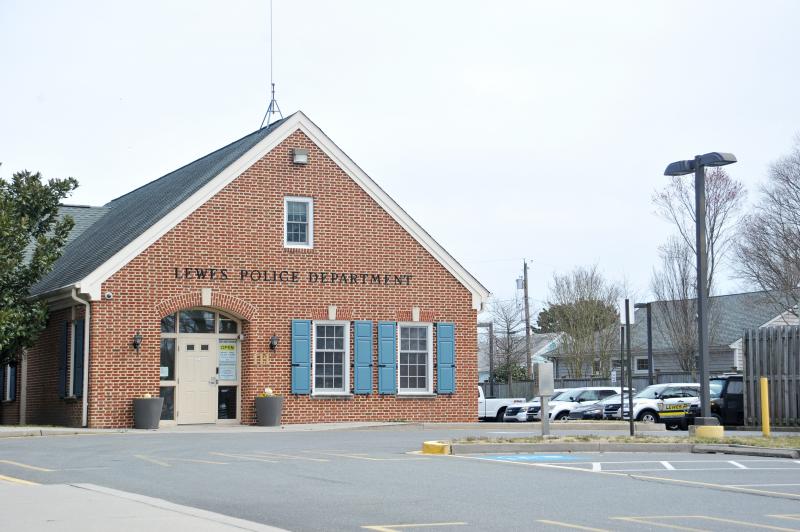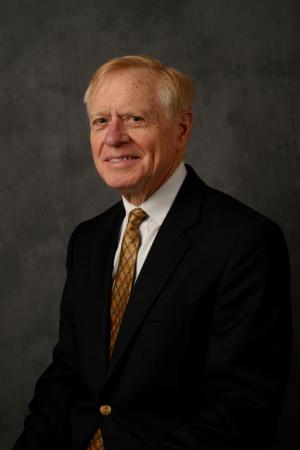Lewes Councilman Rob Morgan did not mince words when opposing the proposed 2021-22 budget at a March 15 meeting, saying the city spends too much money on the police department.
“Police departments should not be one size fits all,” he said. “We are a quiet, low-crime, elderly resort town. Lewes is not a little D.C. or a little Wilmington, and its police department should not strive to be a little Wilmington force.”
Morgan spent about 10 minutes picking apart areas of the department’s budget and operation where he believes funds are being unnecessarily spent. After Morgan’s monologue, council voted 4-1 to approve the budget, including just over $1.6 million for police. The approved police budget is a 9.8 percent increase over last fiscal year and accounts for nearly 25 percent of the city’s operating budget.
Morgan, a councilman since 2014 who is seeking re-election this year, has questioned police department spending for several years, often targeting the purchase of high-performance vehicles in a town where the speed limit is rarely over 25 mph.
While that concern remained this year, he focused much of his ire on council’s recent vote to expand the police force from 13 to 15 full-time officers. He said Police Chief Tom Spell’s request appeared as the last item on a very long Feb. 11 agenda, and council did not discuss the issue until four hours into the meeting.
“The chief spoke for less than three minutes,” Morgan said. “He offered no written analysis or substantiation of the need. He claimed deference four times to his rank and made three assertions.”
Spell, who’s been chief since 2016, requested additional officers based on a desire to have two on-duty patrol officers per shift, continued growth of Lewes and increased traffic from the Cape May-Lewes Ferry, Beebe Healthcare and Cape Henlopen State Park. At the February meeting, Spell also noted the police force had been at 13 officers or fewer since 1999.
“Each of these arguments is weak,” Morgan said.
Morgan believes it’s not uncommon to have one officer per shift, and that the officer can request backup from the chief, lieutenant or detective during normal business hours, or Delaware State Police or Delaware River and Bay Authority police if needed during off hours.
“There are many municipalities that cannot afford and do not provide the level of staffing the chief requested,” Morgan said.
Officers are not cheap, he said, and if recruiting does not turn up a qualified, certified officer, Morgan said the city must pay for a recruit to train at the police academy for seven months before joining the force. Assistant City Manager and Finance Officer Ellen Lorraine McCabe reports that it costs about $100,000 to hire and train an officer. The annual cost after training is about $70,000 to $75,000.
Morgan said the number of seasonal visitors has certainly grown, but not as much as full-time, year-round residents. With many planned developments within or just outside the city, he said he expects the chief to come back with a request to increase his force within a few years.
Morgan said he is not anti-police. For five years early in his career, he worked as a prosecutor in Washington, D.C., collaborating with several police departments on a daily basis.
“I enjoyed my work immensely, and I have a deep respect for officers,” he said.
That work, he said, provided him with a view that not all police departments should be treated the same.
“There are many ways our Lewes Police Department tries to be just like the big-city cops,” he said.
He questioned the need for rifles in every police car.
“Rifles are not for self-defense,” he said. “They are to kill at a distance. The state police are quite capable of supplying a rifleman for that purpose.”
Lewes’ police cars are unnecessarily upgraded for high-speed performance, he said.
“When the need for these is questioned, the answer has been that they need to be able to respond to a crime scene quickly,” Morgan said. “I would hope that the LPD does not respond to a crime scene faster than a normal car can travel, over our streets.”
He later clarified that a civilian-like vehicle should provide enough power to respond to any call within the city in a timely manner.
Spell has indicated that he would like to add a K-9 to the police ranks in the near future, replacing the K-9 that died in 2020. Morgan also opposes this idea, saying the cost to purchase, train and care for a dog is too costly for what the city gets in return, noting the previous K-9 did not see much action besides public demonstrations. The K-9 joined the force in 2013 prior to Spell’s tenure as chief.
“A drug-sniffing attack dog might be suitable for a big city, but the request for one illustrates perfectly how we have misconceived the role of the police in Lewes,” he said.
Majority of council disagrees
In response, Mayor Ted Becker, Deputy Mayor Bonnie Osler and Councilman Andrew Williams each defended the police budget at the March 15 meeting.
Becker said continued development means there will be more full-time residents moving to Lewes in the coming years and the city needs to be ready. He said the latest census numbers show the city has already grown significantly in the last few years.
“We know what is going on on our perimeter and within the community, and it suggests to me that we really need to make sure our officers are fully trained and ready to serve when they’re needed,” he said.
Becker also noted there are several officers who are nearing retirement, and it’s smart planning to have experienced replacements ready to take over.
For Osler, the comparison of Lewes’ police department operating like one in a big city was off target.
“Having two people on duty has nothing to do with Wilmington and everything to do with … having ready backup for our officers rather than having one person out there on their own, and it’s a worthy goal,” she said.
She also challenged Morgan’s assertion that officers should be able to respond to a call at the same pace as a normal car.
“No, we don’t have any chases in Lewes, but I think I speak for a lot of people in Lewes in saying I damn well want those officers to get there in a hurry if I’m in trouble,” she said.
Williams said there are two important things Lewes offers to people who build developments or annex into the city – road maintenance and police coverage – and both departments saw increases in the 2021-22 budget.
“If we’re talking about police or the maintenance department, it’s important to me to have those people in place when the growth is still in front of us,” he said. “That will allow them to be engrained in the community so when these areas come online, they’re already familiar with them and they’re not new to the street, so to speak.”
He also did not buy the argument that Lewes’ seasonal surge in population doesn’t justify more police officers. Morgan had suggested the addition of two seasonal parking enforcement officers for Lewes Beach’s streets – included in the 2021-22 budget – would suffice with visitors during the peak season.
“There are two hotels being built by Arby’s as we speak,” Williams said. “Those people are not going to sit around in their hotel rooms. They’re going to come to Lewes. As far as I understand, they’re not going to be bringing their own police protection or anything else with them. They’re going to require that from the City of Lewes.”
Morgan also indicated the chief lacks a desire to encourage his officers to get out of their cars and meet the community. Spell declined to comment on most of Morgan’s remarks, but he did offer comment on his community policing efforts.
He said it is department policy for officers to get out of the car every night to complete property checks at various businesses and at homes of out-of-town residents who request the service. In 2018 and 2019, he said, his officers completed 2,750 property checks, and found dozens of unlocked businesses and homes.
“They’re always very appreciative,” he said.
Spell’s officers also documented 951 foot patrols during that same time, and they used a grant to purchase bicycles for officers to use for patrolling the community. The police department also held public meet-and-greet events at the Rollins Center, where residents could meet every officer and learn more about their duties, the equipment and the department as a whole.
COVID obviously altered how his officers interact with the community, he said. Before the pandemic, he had also planned to assign an officer to every homeowners association to improve community relationships.
Nick Roth is the news editor. He has been with the Cape Gazette since 2012, previously covering town beats in Milton and Lewes. In addition to serving on the editorial board and handling page layout, Nick is responsible for the weekly Delaware History in Photographs feature and enjoys writing stories about the Cape Region’s history. Prior to the Cape Gazette, Nick worked for the Delmarva Media Group, including the Delaware Wave, Delaware Coast Press and Salisbury Daily Times. He also contributed to The News Journal. Originally from Boyertown, Pa., Nick attended Shippensburg University in central Pennsylvania, graduating in 2007 with a bachelor’s degree in journalism. He’s won several MDDC awards during his career for both writing and photography. In his free time, he enjoys golfing, going to the beach with his family and cheering for Philadelphia sports teams.






















































